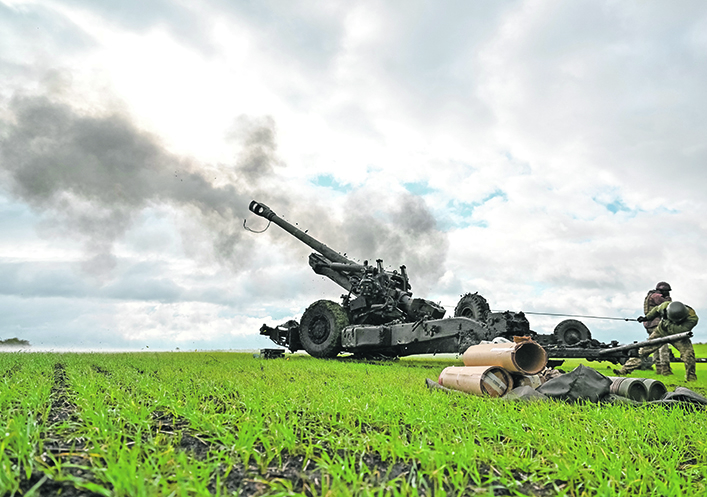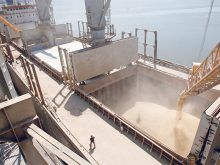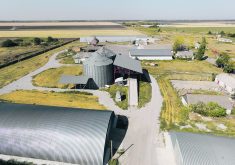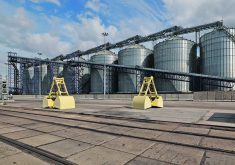From time to time, Oleh visits the positions of troops on the front lines of war in east Ukraine.
While there, he looks hopefully to the horizon. There, just two kilometres away, are his fields, shop and grain warehouse now occupied by Russian invaders.
I will not write Oleh’s last name, nor will I show his photograph because he helps the Ukrainian army and the occupiers have organized a hunt for him. He and his family are forced to travel throughout the territory of Ukraine, never stopping in one place for long.
His parents remain in occupied territory and he fears for their lives and safety.
While the war, as most of the world knows, is only a few months old, Oleh was also near the scene of Russia’s earlier invasion of Crimea and Donbas eight years ago.
“The war for me started back in 2014,” he said. “I sowed grain and harvested under regular enemy fire. I miraculously avoided death several times. In addition, most of my compatriots are politically passive people. Some openly wanted us to be taken over by the Russian army. That’s why I got used to risk. I walked under threat even when hostilities were limited to the territory of Donbas.”
Oleh has a story familiar to the latest generation of Ukrainian agriculture. He worked for many years as an agronomist in a large agricultural company. A few years ago, he realized he could start his own business. He started with 50 acres of land that belonged to his family. Later, he increased his farm to 185 acres.
“This is the optimal area for a farmer like me,” he said. “First, I can control every spike in the field. Second, spend time with my family. Thirdly, to have time to develop and go to agricultural exhibitions.”
Eastern Ukraine is an arid steppe region. Only winter wheat and barley, as well as sunflowers, can normally be grown here. Oleh produced 2.2 tonnes of wheat per acre, which is considered an excellent yield for his area. He has also made sacrifices to grow his farm.
“I have not been able to give enough money to my family for several years in a row,” he said. “I directed all profits from the farm to development. In particular, I managed to realize the dream of all Ukrainian small farmers — to purchase my own modern combine harvester. If you have your own harvester, you will always have money.
Last year, he built his own grain warehouse — a 13 by 20 metre structure.
“And then I thought that I would finally be able to work effectively.”
Then came the war, and Oleh’s new granary was one of the first targets of the occupying artillery. On Feb. 24, the Russian military began shelling the village where he farms. Half of his harvest was stored in this granary.
“That was my net profit. After years of austerity, I was finally able to sell this grain and give my family money. Now this grain is most likely stolen by the occupiers,” he said.
The war spread to the nearby town where Oleh and his wife lived.
“As the intensity of shelling increased, I realized that I needed to go to the village to visit my parents,” he said.
They left most of their belongings behind, taking only some clothes, the dog and dog food.
Several mortar shells then hit Oleh’s house. His farm and agricultural machines were also affected.
“The village we moved to with my parents became empty. People were afraid to go outside. I couldn’t sleep or eat, and I knew I was going crazy if I didn’t go outside.
“I walked and saw many of our soldiers preparing for defence. It was all done in a hurry and it was obvious that their supply of food and other resources had not yet arrived.”
Oleh asked to speak to their commanding officer.
Oleh insisted the school be opened and heated, that the cafeteria be opened and school rooms turned into bedrooms for the soldiers. He organized the supply of bread and cigarettes, the scarcest goods in wartime. He invited soldiers to his house so they could wash.
“I’m sad to remember some moments. I say to the soldier, ‘come to our house to wash’. He says, ‘I will not go, because I am ashamed.’ I ask why and he said ‘I didn’t take off my shoes for two weeks.’ ”
The first days of war are a thin line that separates normal life and a new reality. So, when Oleh saw that the tires on the military vehicles had burst, he offered to open the locked shop at his farm on the front line where agricultural machinery was stored.

“The soldier-driver with whom I went was terribly surprised when he saw that I had picked up an iron crowbar to break the lock. He said, ‘because you are going to sow soon, why are you removing the wheels from trucks and tractors?’ I answer him: ‘In a week there will be nothing left here, so take everything you need to protect us.’”
However, the enemy pressed forward and two weeks later, it became clear the Ukrainian troops would be forced to retreat. Oleh was called by the commander and advised that he and his family should go to safe territories.
“After the officer said this, we shook hands and went our separate ways. And in a moment, an enemy shell hit the place where we were standing.”
After that, Oleh and his family lived a nomadic life. They have been living with friends in different regions of Ukraine for almost eight months.
“Frankly speaking, in the first months of the war, I could not even think about agronomy and fields. I felt a deep inner devastation and did not know what to do. It became easier for me only when I started helping my friends in building a house. I felt needed and saw that I could work,” he said.
Oleh could easily get a job working for a large agricultural company but he does not dare to take this step.
“You see, my fields are literally in front of the positions of our troops. Literally one shot away.
“I sometimes come there and look at them. I believe that someday, maybe very soon, the Ukrainian army will regain this territory. I want to work at home in my fields.”















